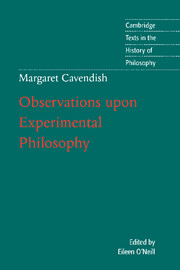Book contents
- Frontmatter
- Contents
- Acknowledgement
- List of abbreviations
- Introduction
- Chronology
- Further reading
- Note on the text
- Observations upon Experimental Philosophy
- To Her Grace the Duchess of Newcastle
- To His Grace the Duke of Newcastle
- To the Most Famous University of Cambridge
- The Preface to the Ensuing Treatise
- To the Reader
- An Argumental Discourse
- The Table of All the Principal Subjects
- Observations upon Experimental Philosophy
- Further Observations upon Experimental Philosophy
- Observations upon the Opinions of Some Ancient Philosophers
- Glossary
- Index
- Cambridge texts in the history of philosophy
The Preface to the Ensuing Treatise
Published online by Cambridge University Press: 05 June 2012
- Frontmatter
- Contents
- Acknowledgement
- List of abbreviations
- Introduction
- Chronology
- Further reading
- Note on the text
- Observations upon Experimental Philosophy
- To Her Grace the Duchess of Newcastle
- To His Grace the Duke of Newcastle
- To the Most Famous University of Cambridge
- The Preface to the Ensuing Treatise
- To the Reader
- An Argumental Discourse
- The Table of All the Principal Subjects
- Observations upon Experimental Philosophy
- Further Observations upon Experimental Philosophy
- Observations upon the Opinions of Some Ancient Philosophers
- Glossary
- Index
- Cambridge texts in the history of philosophy
Summary
It is probable, some will say, that my much writing is a disease; but what disease they will judge it to be, I cannot tell; I do verily believe they will take it to be a disease of the brain; but surely they cannot call it an apoplectical or lethargical disease: Perhaps they will say, it is an extravagant, or at least a fantastical disease; but I hope they will rather call it a disease of wit. Let them give it what name they please; yet of this I am sure, that if much writing be a disease, then the best philosophers, both moral and natural, as also the best divines, lawyers, physicians, poets, historians, orators, mathematicians, chemists, and many more have been grievously sick: and Seneca, Pliny, Aristotle, Cicero, Tacitus, Plutarch, Euclid, Homer, Virgil, Ovid, St. Augustine, St. Ambrose, Scotus, Hippocrates, Galen, Paracelsus, and hundreds more, have been at death's door with the disease of writing. Now, to be infected with the same disease, which the devoutest, wisest, wittiest, subtlest, most learned and eloquent men have been troubled withal, is no disgrace; but the greatest honour that can happen to the most ambitious person in the world: and next to the honour of being thus infected, it is also a great delight and pleasure to me, as being the only pastime which employs my idle hours; insomuch, that, were I sure nobody did read my works, yet I would not quit my pastime for all that: for although they should not delight others, yet they delight me; and if all women that have no employment in worldly affairs, should but spend their time as harmlessly as I do, they would not commit such faults as many are accused of.
- Type
- Chapter
- Information
- Publisher: Cambridge University PressPrint publication year: 2001

